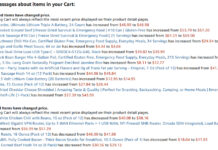Earlier this week, I had planned to run by the bank, replenish my cash on hand, and then go to Walmart to see what was in stock. I was going to buy more sugar for the bees and see what canned meats and other items for our prepper pantry were in stock. I was also looking forward to getting a couple of those chocolate-covered Entenmann donuts. The night before my trip, I realized nothing I was going to buy was a “must have,” and I decided to stay home and save the gas.
Keep in mind going to Walmart from my isolated homestead isn’t dashing down the street or around the corner. From where I live, it’s a 35 or 40 minute drive. By not going, I’m saving at least $10 worth of gas.
Because of this decision, Walmart won’t see $60 to $80 in revenue, Hormel will not make a sale, Entenmann’s may have some donuts go stale, and I won’t be stopping by Exxon to fill my tank.
Instead, I’ll wait until I have a reason to go out next week. For example, my wife’s car needs its oil changed, so when I take it in, I’ll go shopping out that direction instead. Eventually, I’ll need a haircut; I can always go to Walmart before or after I visit the barber. There’s also the possibility that my wife will go grocery shopping at Walmart and I can tag along with her. Of course, if she’s there, I won’t be able to sneak any donuts into the cart.
Cutting Back
Gasoline prices around here have gone up a dime a day for several days in a row. The average price of gas nationally has increased for ten days in a row, and each day was a record. The ride isn’t over, either. JP Morgan expects gas to rise another $1.50 or more per gallon, reaching an average of $6.20 by August.
I’ve always said that you’ll know we are in hyperinflation territory when you see prices change daily. Well, gasoline and diesel fuel meet that criteria.
I have a friend who drives his Chevy Silverado ten miles to work and ten miles back. Everywhere else, he takes’ his wife’s Hyundai because it gets better gas mileage. A year ago, he drove that truck, which is paid for, everywhere. They’ve also stopped buying the brand of coffee they like and made other concessions to save money. He says they are keeping their head above water, but they are no longer putting away money for a down payment on a future house. They’ve gone from a two-income family that got ahead every month to one that is lucky to stay even.
I know people who have not put their boats in the water yet this spring because of the high cost of gasoline. Not only do their boats consume fuel, but they have to tow them to the lake. Towing cuts your gas mileage considerably. Maybe they still will go to the lake on Memorial Day or the Independence Day, but they aren’t making the trip a couple times a month like they did in the past. Because the cost of a day on the water has just about doubled, they’ll stay home and grill out in the backyard instead.
I’m wondering how many catch and release fishermen will start eating their catch. Or maybe they’ll start fishing from the shore and be happy with a dozen pan fish to fry up.
All of that means less bait, fishing tackle, charcoal, hamburgers, and beer gets sold. It could also mean employee layoffs and less revenue and profit for the owners of the bait shops and dockside retailers.
Beyond Gasoline
Since we are in the middle of summer, no one is talking about the cost of home heating oil or propane, but their costs are also rocketing upwards. Home heating oil is similar to diesel fuel, and its prices reflect that similarity. The average cost of a gallon of home heating oil is well above $5, more than double its $2.24 per gallon cost one year ago. The most common tank is 275 gallons, meaning it now costs more than $1,400 to fill your tank, and many users go through multiple tanks per winter.
Propane is also up to more than $4 in some locations, more than tripling the average cost a year ago, according to the U.S. energy information association.
Natural gas futures are over $8 for a million BTUs, up from less than $3 a year ago. In the short term, that’s likely to affect your electric bill. In six or eight months, your heat bill is going to go through the roof.
We see plenty written about how tough it is going to be in Europe this winter. It won’t be much easier here. Home heating bills are going to kill people’s budgets.
Higher Utility Bills
Have you ever had your utilities cut off for non-payment? Not only is it an embarrassment, an inconvenience, and creates unsafe living conditions, they charge you even more to turn them back on. You can appeal to the company and seek help from government programs and charities, but I expect that charity money will go fast this winter. We are going to see misery by January.
Years ago, when I lived in an apartment building in not the best section of town, my electric bill shot up for no apparent reason. The electric company sent an investigator out, and they found that one of our neighbors had run a set of jumper cables from our meter to theirs after their service was disconnected. In effect, I the cost for their electricity was appearing on my bill.
We’re going to see that level of desperation in the winter of 2022/23. That kind of theft of services is going to be the mildest kind of crime. I expect burglaries, muggings, armed robberies, home invasions, follow-home robberies, car jackings, and other crimes to increase as desperate people turn to a life of crime to make money.
Recession Bound
Have you seen the stock market? It’s crashing like it hasn’t crashed for 90 years. For those of you who are math-challenged, that harkens back to the Great Depression.
As the stock market drops, people feel poorer. Even if their salaries remain unchanged, they recognize they have less wealth and they are less likely to make large purchases.
There’s a reason 68 percent of CEOs surveyed by The Conference Board expect a recession. It has to do with the price of fuel, inflation, and the Federal Reserve’s actions.
If you listen to the Biden Administration, they’ll tell you consumer spending appears to be holding up. That’s true until you adjust for inflation. People are spending more, but they are buying less because costs are so high. That’s not a winning formula for any administration.
Salaries are also falling behind. The average raise in 2022 has been about half the rate of inflation. That means most workers are making a little more but spending a lot more on their groceries, gas, and other necessities. The people living paycheck-to-paycheck are getting hurt as each paycheck buys less. Those on a fixed income are really suffering.
Before long, many more people than I will stay home, but it won’t be by choice. It will be because they are newly unemployed.







